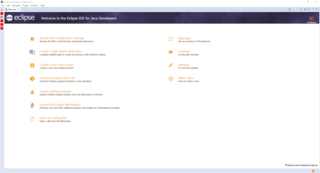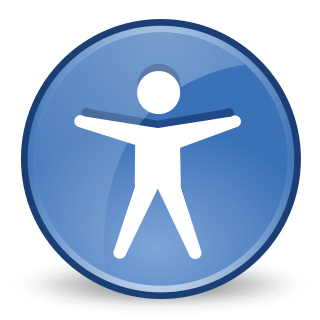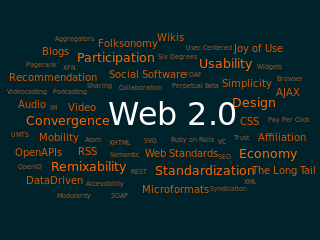In computing, cross-platform software is computer software that is implemented on multiple computing platforms. Cross-platform software may be divided into two types; one requires individual building or compilation for each platform that it supports, and the other one can be directly run on any platform without special preparation, e.g., software written in an interpreted language or pre-compiled portable bytecode for which the interpreters or run-time packages are common or standard components of all platforms.

Gambas is the name of an object-oriented dialect of the BASIC programming language, as well as the integrated development environment that accompanies it. Designed to run on Linux and other Unix-like computer operating systems, its name is a recursive acronym for Gambas Almost Means Basic. Gambas is also the word for prawns in the Spanish, French, and Portuguese languages, from which the project's logos are derived.

Eclipse is an integrated development environment (IDE) used in computer programming, and is the most widely used Java IDE. It contains a base workspace and an extensible plug-in system for customizing the environment. Eclipse is written mostly in Java and its primary use is for developing Java applications, but it may also be used to develop applications in other programming languages via plug-ins, including Ada, ABAP, C, C++, C#, Clojure, COBOL, D, Erlang, Fortran, Groovy, Haskell, JavaScript, Julia, Lasso, Lua, NATURAL, Perl, PHP, Prolog, Python, R, Ruby, Rust, Scala, and Scheme. It can also be used to develop documents with LaTeX and packages for the software Mathematica. Development environments include the Eclipse Java development tools (JDT) for Java and Scala, Eclipse CDT for C/C++, and Eclipse PDT for PHP, among others.
The Globus Toolkit is an open-source toolkit for grid computing developed and provided by the Globus Alliance. On 25 May 2017 it was announced that the open source support for the project would be discontinued in January 2018, due to a lack of financial support for that work. The Globus service continues to be available to the research community under a freemium approach, designed to sustain the software, with most features freely available but some restricted to subscribers.
The ArsDigita Community System (ACS) was an open source toolkit for developing community web applications developed primarily by developers associated with ArsDigita Corporation. It was licensed under the terms of the GNU GPL, and is one of the most famous products to be based completely on AOLserver. Although there were several forks of the project, the only one that is still actively maintained is OpenACS.
In computing, a solution stack or software stack is a set of software subsystems or components needed to create a complete platform such that no additional software is needed to support applications. Applications are said to "run on" or "run on top of" the resulting platform.

Accessibility Toolkit (ATK) is an open source software library, part of the GNOME project, which provides application programming interfaces (APIs) for implementing accessibility support in software.

LAMP is an archetypal model of web service stacks, named as an acronym of the names of its original four open-source components: the Linux operating system, the Apache HTTP Server, the MySQL relational database management system (RDBMS), and the PHP programming language. The LAMP components are largely interchangeable and not limited to the original selection. As a solution stack, LAMP is suitable for building dynamic web sites and web applications.
Echo is a web application framework created by the company NextApp. The latest iteration, Echo3, allows writing applications in either server-side Java or client-side JavaScript. Server-side applications do not require developer knowledge of HTML, HTTP, or JavaScript. Client-side JavaScript-based applications do not require a server, but can communicate with one via AJAX.

Dojo Toolkit is an open-source modular JavaScript library designed to ease the rapid development of cross-platform, JavaScript/Ajax-based applications and web sites. It was started by Alex Russell, Dylan Schiemann, David Schontzler, and others in 2004 and is dual-licensed under the modified BSD license or the Academic Free License.
Cactus is an open-source, problem-solving environment designed for scientists and engineers. Its modular structure enables parallel computation across different architectures and collaborative code development between different groups. Cactus originated in the academic research community, where it was developed and used over many years by a large international collaboration of physicists and computational scientists.
As of the early 2000s, several speech recognition (SR) software packages exist for Linux. Some of them are free and open-source software and others are proprietary software. Speech recognition usually refers to software that attempts to distinguish thousands of words in a human language. Voice control may refer to software used for communicating operational commands to a computer.

Openmoko Linux is an operating system for smartphones developed by the Openmoko project. It is based on the Ångström distribution, comprising various pieces of free software.
Web-based simulation (WBS) is the invocation of computer simulation services over the World Wide Web, specifically through a web browser. Increasingly, the web is being looked upon as an environment for providing modeling and simulation applications, and as such, is an emerging area of investigation within the simulation community.
A software widget is a relatively simple and easy-to-use software application or component made for one or more different software platforms.
Wt is an open-source widget-centric web framework for the C++ programming language. It has an API resembling that of Qt framework, also using a widget-tree and an event-driven signal/slot system.
The JBoss Enterprise Application Platform is a subscription-based/open-source Java EE-based application server runtime platform used for building, deploying, and hosting highly-transactional Java applications and services. The JBoss Enterprise Application Platform is part of the JBoss Enterprise Middleware portfolio of software. Because it is Java-based, the JBoss application server operates across platforms; it is usable on any operating system that supports Java. The JBoss Enterprise Application Platform was developed by JBoss, now a division of Red Hat, now a division of IBM.
This is a list of articles related to the JavaScript programming language.







